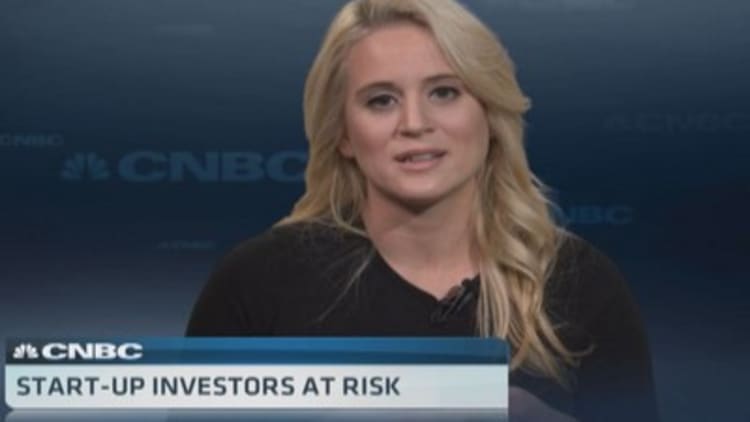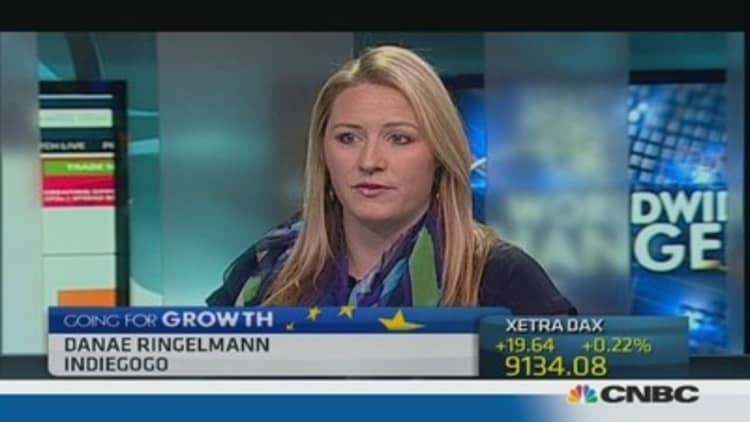
Looking to put your life savings into an unproven start-up, and hopefully cash out when it hits big?
Rules under consideration by the Securities and Exchange Commission would allow start-ups to "crowdfund" their businesses, raising capital from people who have traditionally been barred from making such risky investments.
But while the crowdfunding phenomenon (essentially raising small amounts of money from a large pool of investors) has worked for companies like Kickstarter and Indiegogo—which fund specific projects like films and music, trying to fund start-ups this way could prove disastrous for many people, experts say.
(Read more: You hear lots about crowdfunding, but what is it?)
"In its infinite stupidity, Congress told the SEC you have to allow this kind of crowdfunding. What they didn't say is that we will turn it around if you don't put the right guards around it," said Lynn Turner, a former SEC chief accountant.
In October, the SEC proposed rules to address Title III of the 2012 Jumpstart Our Business Start-Ups (JOBS) Act. Title III is the section of the legislation that will allow equity crowdfunding from nonaccredited investors: people worth less than $1 million and annual incomes below $200,000. The SEC rules and regulations that will govern this new system are expected to pass next month.
The change could potentially be a goldmine for start-ups, allowing them to forgo expensive venture capital money and fund their businesses via the vast pool of mom-and-pop investors.
(Read more: Crowdfunding their way to the Olympics)
"There's a danger for everyone involved," Turner said. "Unless you have the expertise to do the necessary homework for this type of investment, you are doing nothing different than making a bet at the craps table in Vegas, and the outcome in Vegas may very well be better."
For one thing, a start-up that finances this way may not have transparent disclosures or solid financial statements, making it hard to gauge the company's value or riskiness, Turner said. Low-net worth investors are unlikely to have the necessary expertise to figure that out, he said.
Another concern: How do you sell your stake if you want to get out? Hard to tell, said Barry Silbert, founder and CEO at Secondmarket.
When VCs invest in start-ups they always include in the deal that the company has to buy back its investment or sell itself to get a return, Turner said. But on crowdfunding deals, there is no requirement whatsoever that these little companies will have to go public or sell themselves.
"You are basically giving your money to a management team, and they can do whatever they want. Most Americans will never realize that they need those cash provision agreements," Turner said.
(Read more: Crowdfunding 2.0: A new era for start-up finance)
Also, new companies turn to venture capital not just for money but also for expertise. While there may be a few cases of successful start-ups stemming from crowdfunding, for most it will not be enough, Turner said.
"The Facebooks, Googles and Twitters of the world attract VCs and their backing. So the cream of the crop raises money from VCs because they bring expertise in addition to their money. And these companies tend to do better than companies that aren't VC funded."

Problems aside, there's still likely to be a lot of demand for this kind of funding, both from mom-and-pop investors and from the start-ups themselves, said Sandhya Venkatachalam, founding partner of Centerview Capital Technology.
"This democratizes access to funding for good entrepreneurs and good CEOs that may not have had the right network and would have had to pay a higher cost of equity," she said.
But the fallout from investors not realizing the dangers could be huge, Turner said.
Turner likened the rise of equity crowdfunding to bucket shops in the 1920s or to the penny stock fraud cases in the 1990s.
"We didn't learn anything," he said. "We have seen this picture before, and we are setting ourselves up for the same thing."
—By CNBC's Cadie Thompson. Follow her on Twitter @CadieThompson.





